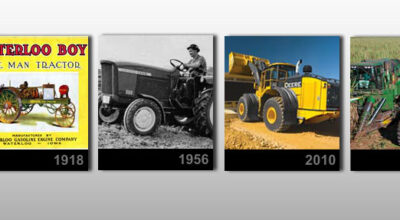Since its inception more than 175 years ago, John Deere has become a globally recognizable brand that now has facilities and offices in more than 30 countries across the world. The wide-spanning presence allows the company to be present where their customers are located so they can meet their needs and requirements.

While it might seem as if John Deere has been a worldwide brand from the start, there were a number of key events that helped it expand beyond the American shores.
Let’s take a look at some of the key years responsible for some of John Deere’s worldwide growth.
1950
A member of the John Deere export department went on a trip to Europe to determine why sales were lagging in the region. It turned out the cost of exporting from the U.S. was causing Europeans to invest in equipment that was made closer to home.
Similar pressures were being faced south of the United States border in Mexico, and as a result, Hewitt and the Deere Board of Directors determined it was a smart decision to build a sales branch and manufacturing plant in Mexico.
1955
In 1955, Deere’s President, William A. Hewitt, set forth a number of initiatives to improve its worldwide agriculture presence. One of these initiatives was buying a controlling interest in a French consortium named CCM, which produced forage harvesters, tillers, and balers.
1957
Following an upswing in popularity from Argentinian customers, Deere and Company built a tractor assembly plant in Rosario, which produced 3,000 units a year.
1959
Deere opened a tractor and implement factory near Monterrey, Mexico, to support the local interest in the company’s equipment.
1962
Deere had completed construction on a three- and four-cylinder engine factory in Orléans, France, and continued to invest in new acquisitions. Around this time, Deere also bought an African implement maker named South African Cultivators Ltd.
Final Thoughts
These are just a few of the many years in John Deere’s company timeline that were important to its worldwide expansion. Deere continues to expand across the world today in an effort to feed the world’s growing population.
If you enjoyed this post or want to read others, feel free to connect with us on Facebook, or Twitter!


